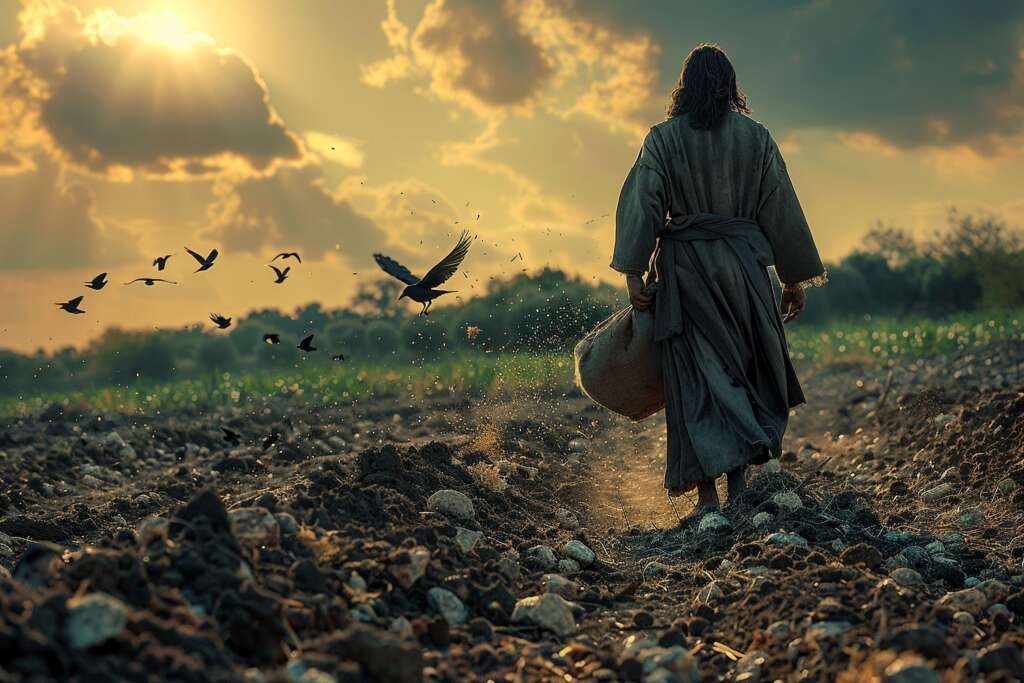In his parable of the Sower (Matthew 13:1 ff.), Jesus explained to His audience the importance of roots in agronomy. Yet, this wasn’t a strictly practical scientific presentation but rather a spiritual one. Jesus saw a correlation between a healthy root system on a plant with a healthy spiritual life in a person. While Jesus knew much better than I what His point was, I wonder whether it might be possible to coax a bit more nuance from the parable, so we can relate to it on a whole different level and apply it to contemporary events. I’m using trees for my example here. I believe that there is much about trees that we have to learn, as you’ll read here and here. But these generalizations apply to most other plants as well.
THE PARABLE OF THE SOWER

I previously discussed the “Parable of the Sower” here. The Sower is a farmer and he seeds his fields the traditional way . . . by broadcasting the seeds more or less indiscriminately. He takes handfuls of seeds and scatters them in an arc ahead of him as he walks through his field. But, this approach is very inefficient, because part of the seed is wasted as Jesus notes in the parable. In some instances farming was, and possibly still is, no better than throwing spaghetti against a wall hoping some of it will stick. I’m thinking of fields where there are rocky outcroppings or areas around trees where every inch of fertile ground counts.
The seed is often eaten hungrily by birds as we see in the illustration, even as the deer make short work out of my begonias. In other cases in the parable, the seed never sprouts at all, or it falls on compacted or hardpan soil. Today, we have cultivation machines and all sorts of techniques and conveniences that farmers never had back then. Still, there is no guarantee of complete success. Note that the problem in the parable is not the fertility of the seed itself, but rather where the seed lands. Medications are processed in our liver. Important truths are processed in our minds and hearts. In our society today, the same message or circumstances can harden the hearts of some people while melting the hearts of others.

The seed in the parable is God’s word. In the case of many people who hear Scripture or spiritual truths, the words run off them like water on a duck’s back. It’s what they call today “word salad.” But the same truths catch the attention of other people. A pique in your interest hearing an occasional sermon message or watching a Christian movie is necessary, but not sufficient to make a difference in your life. The seed of the Gospel (the Kerygma1) must be able to take root in your heart. It has to percolate inside of you. Likewise, the roots of the seed need to spread out and plunge deep into the ground for reasons you’ll come to understand.
Roots serve many functions to a tree. First and foremost, they anchor a tree firmly in the ground. When you purchase a tree at a nursery, you receive instructions on how to water it. The worse thing you can do is direct the water stream exclusively to the point where the trunk of the tree emerges from the ground. When you do this, the roots have no incentive to grow horizontally, and a strong wind can easily topple the tree, even years after it has been planted. And the higher a tree grows, the more important a firm root structure becomes. You can also destroy a tree by watering too shallow or by not watering enough. In climates where rain is scarce, it is true that some plants such as Mesquite trees will put down deep taproots searching for water from some hypothetical aquifer, but as a rule, plants and trees will spread their roots near the surface since very little water is available to soak through the ground.
Even so, the gospel message, the kerygma must take root in our heart. We must let it anchor us to those aforementioned eternal spiritual truths if we are to prevail and resist temptation and persecution. Many of these eternal truths can be found here.
THE PROBLEM
Today, Church members are being lead astray by everything from false prophecies to logical fallacies. Christians who are weak in the Word are falling for all sorts of nonsensical teachings. “God wants you rich.” “God wants you to vote Republican.” “God wants you to vote Democrat.” Take persecution for example. The Church in America has never faced true persecution . . . so far. A congregation that loses its tax exempt status for violating FECA regulations is not being persecuted. A pastor who unlawfully entered Congress on January 6, 2021 surrounded by people intent on destabilizing our government and who was tried and jailed was not persecuted. A congregation enjoined for defying public heath closures on common areas such as schools, meetings and businesses in order to control a deadly pandemic is not being persecuted. A believer who communicates threats to gays and democrats and gets arrested is not persecuted. A Christian who trespasses on private property (such as a Planned Parenthood office) and refuses to leave is not persecuted when the police take him away in handcuffs. These are all people who broke the law. Whether there is any nobility to these motives lies in the eyes of God, though I am not personally sympathetic myself.
MORE ON ROOTS
Roots also ferry water and nutrients from the spoil to other parts of the tree. Failure to so so means that the tree may ultimately die. Where there is too much water, the roots may rot and the tree may die as well. Most of us have seen dead tree trunks around lakes or reservoirs that have been created to store runoff water. In some cases, the remains of trees are left standing perhaps to provide habitats for fish.
The secrets to a tree’s continued health include strong resistance to environmental stressors like drought and pests. In our society today, we have an unprecedented amount of stress (at least as far as my lifetime is concerned.) Twenty two veterans alone commit suicide every day. That’s more than 8,000 a year. In recent times, one in four teenage girls admitted to deliberately harming themselves. Then there are people abusing drugs like fentanyl, alcohol and so on. It would be foolish to think this this doesn’t happen to Christians. At this moment, our intelligence satellites are watching to see if Russian President Vladimir Putin moves his nuclear assets to the borders of NATO and the Ukraine. If you do not have something firm to anchor yourself to, the tides of change may wash you away. Sound biblical teaching and the the Spirit of Christ are needed to prevail. Trees also need the ability to regenerate from disease and injury. This can be difficult even for healthy trees, but is impossible for those trees that are compromised.
In humans, there are certain genes involved in the process of a person dying. In other cases, it is a matter of mutations of healthy genes. But trees (there are 356 million base pairs in the fig genome) have no “death genes.” They just keep on going as long as the tree is healthy. As people, we cannot do this because of the corrosive effects of sin. Sin limits our longevity as the BIble predicts, whether by mutating our genes or through some other process which might not be on a microscopic level. A person who plans an armed robbery and gets shot and killed by a bank guard is just as dead as someone dying from some deadly disease. This is not to say that God singles out people who do bad things and punishes them with a lethal disease. Neither does He necessarily rescue us from the consequences of our actions.
Trees are designed to be around for the “long haul.” We can learn a lot about trees–and ourselves–in the Bible. I encourage you to read for yourself and then share what you learn with others!
FOOTNOTES
1“The Greek word kerygma (κήρυγμα) means proclamation. It appears in the New Testament, and is related to the Greek verb kērússō (κηρύσσω), which means “to cry or proclaim as a herald”.
In the Christian context, kerygma refers to the proclamation of the Good News of Jesus’ life, death, and resurrection. The Apostles began by proclaiming a simple message about Christ, with more in-depth teaching coming later. The kerygma is central to the identity of the Church and every baptized Christian.
The word kerygma comes from a practice in the ancient world, where kings would send a kerux, or town crier, to announce their decrees throughout their realm.” Credit: AI (Chat GPT 4.0.)




